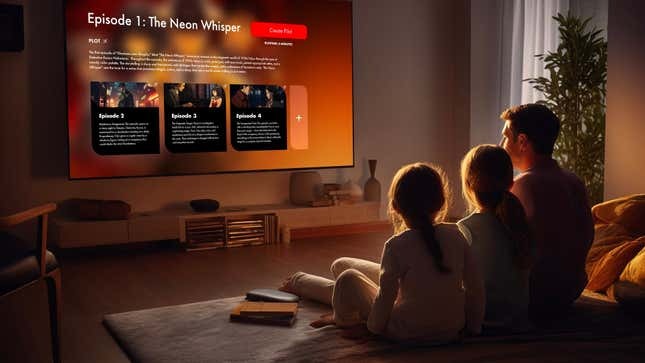Showrunner will enable users to generate episodes using prompts, raising concerns about its implications or simply being a passing trend
One of the primary tactics of streaming services is to maximize your screen time. Once an episode of a show concludes, the next one typically starts automatically. However, this method has its drawbacks. For instance, when a series ends, Netflix may attempt to autoplay another series it believes you’ll enjoy, but this often fails. Perhaps the suggested show’s tone is off, or maybe transitioning into a new show’s complex storyline feels overwhelming. It can be jarring to abruptly shift from one narrative world to another without a moment to pause and transition.
Wouldn’t it be great if Netflix offered the option to automatically generate a new episode of the show you’re currently watching? You could stay immersed indefinitely. Well, the good news is that this technology now exists.
This week, Fable Studio introduced Showrunner, the first AI-generated streaming service. With just a few prompts, Showrunner enables viewers to create, voice, and animate their own TV episodes.
Users who join the Showrunner waitlist will eventually gain access to 10 animated shows. Among them, Ikiru Shinu is described as a dark horror anime, while Sim Francisco is an anthology series centered on individuals in the city of the same name. Additionally, Exit Valley offers a Silicon Valley satire in the style of South Park. Viewers can either watch these episodes or create their own by providing prompts, which are then transformed into scenes that are assembled into full episodes. For instance, after watching Exit Valley, a user could type a prompt such as “The characters in this entertainment industry satire discover they are part of an AI-generated content scheme aimed at destroying the entertainment industry, leading to a head-exploding satire in the next episode.”
This situation could evolve in one of two directions. The major concern, which essentially instigated all the Hollywood strikes last year, is that even if Showrunner doesn’t become a mainstream hit, the entertainment industry will still adopt this technology extensively. Initially, the adoption might be gradual: perhaps a studio will use it to generate movie concepts, which can then be polished by their team of human experts. However, over time, this intermediary step could diminish, resulting in an entertainment industry where three or four executives come up with AI prompts like ‘Dinosaur attacks girl with big boobs’ and retain all the profits for themselves.
However, based on current evidence, that scenario is unlikely to unfold just yet. At present, Showrunner seems to be more of a novelty. Initially, a wave of users may use it to create numerous low-quality videos, turning the platform into a somewhat less human version of TikTok or a Quibi that’s not as cringeworthy. My theory is that initially, everyone will create their own episodes and try to share them, but others won’t watch because they’re busy watching episodes they’ve created themselves. As a result, people will eventually lose interest because what’s the point of creating something only for yourself? The bar for creation has been set too low. Interest will wane quickly.
This might actually be a positive development. The movie industry certainly needs all the help it can get right now. Perhaps Showrunner serves as a reminder that robots are even worse at creating content than we are. If that doesn’t push us back toward the mainstream, nothing will.
